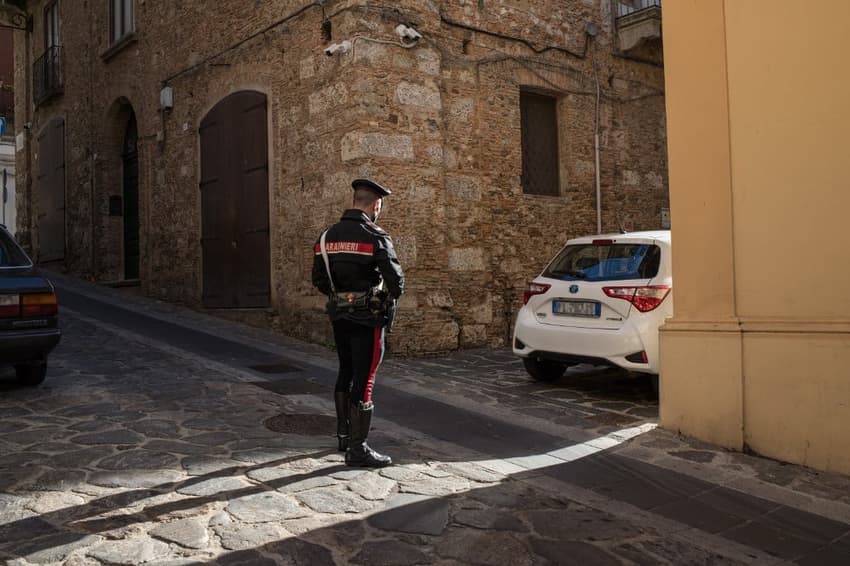Italian police seize €250 million and arrest 56 in latest mafia blitz

In its latest mafia sting, Italian police took down a large 'Ndrangheta ring in southern Calabria, placing 56 people under investigation including a regional councillor and a former head of the regional tourism board.
The early-morning blitz by over 300 police focused on areas of Calabria – Italy's poorest region – under the control of the Mancuso clan, a powerful branch of the infamous 'Ndrangheta, many of whose top operatives are among hundreds of defendants in an ongoing 'maxi-trial'.
Fifty-six people, many already in prison, were put under criminal investigation for a series of crimes including mafia-related conspiracy, extortion, kidnapping, bribery and possession of weapons, police and prosecutors said.
READ ALSO: 'Ndrangheta: It's time to bust some myths about the Calabrian mafia
Besides alleged mafia members, the operation also snared businessmen, a regional councillor released from prison days earlier, a former head of the regional tourism board and two civil servants, police said.
The incarcerated boss of the clan, Luigi Mancuso, also known as "The Supreme", is the biggest mafioso in the massive mafia trial that started in January 2021.
Still, police said, his clan and affiliates, including the La Rosa and Accortini families, have continued to dominate illegal activities in the Vibo Valentia province, which is located right on the toe of Italy's boot and is widely known as the 'Coast of the Gods' due to its stunning coastal views.
One mafia scheme involved the infiltration of a foreign tour operator in Pizzo Calabro, overlooking the Tyrrhenian Sea.
No one talks
In Calabria, the extent of the 'Ndrangheta's reach in the local economy has made it near impossible to eradicate it.
By controlling the bulk of cocaine flowing into Europe, the 'Ndrangheta has surpassed Sicily's Cosa Nostra in power and wealth. It has extended far beyond its rural roots and now operates internationally, with illegal gains reinvested in the legitimate economy.
In the area around Vibo Valentia, extortion of local businesses and the fixing of public tenders is also common.
The allegations against those arrested Thursday include the transport and sale of stolen farm machinery to Malta and Romania, police said.
The sting carried out on Thursday extended to other parts of Calabria, Palermo in Sicily and as far as Rome and Milan, police said.
READ ALSO: Meet Nicola Gratteri, the prosecutor leading Italy's battle against the mafia
In a press conference, anti-mafia prosecutor Nicola Gratteri, whose efforts to defeat the 'Ndrangheta have forced him to live under police escort for over 30 years, called the group a "fierce mafia syndicate" controlling areas around the tourist resort of Tropea.
Francesco Messina, who leads Italy's organised crime investigative unit (DAC), cited the economic power of the clan, which relies locally on "substantial" extortion activity.
The "total absence" of complaints to authorities was striking, Messina said, underscoring the 'Ndrangheta's power to intimidate.
By Alexandria Sage
Comments
See Also
The early-morning blitz by over 300 police focused on areas of Calabria – Italy's poorest region – under the control of the Mancuso clan, a powerful branch of the infamous 'Ndrangheta, many of whose top operatives are among hundreds of defendants in an ongoing 'maxi-trial'.
Fifty-six people, many already in prison, were put under criminal investigation for a series of crimes including mafia-related conspiracy, extortion, kidnapping, bribery and possession of weapons, police and prosecutors said.
READ ALSO: 'Ndrangheta: It's time to bust some myths about the Calabrian mafia
Besides alleged mafia members, the operation also snared businessmen, a regional councillor released from prison days earlier, a former head of the regional tourism board and two civil servants, police said.
The incarcerated boss of the clan, Luigi Mancuso, also known as "The Supreme", is the biggest mafioso in the massive mafia trial that started in January 2021.
Still, police said, his clan and affiliates, including the La Rosa and Accortini families, have continued to dominate illegal activities in the Vibo Valentia province, which is located right on the toe of Italy's boot and is widely known as the 'Coast of the Gods' due to its stunning coastal views.
One mafia scheme involved the infiltration of a foreign tour operator in Pizzo Calabro, overlooking the Tyrrhenian Sea.
No one talks
In Calabria, the extent of the 'Ndrangheta's reach in the local economy has made it near impossible to eradicate it.
By controlling the bulk of cocaine flowing into Europe, the 'Ndrangheta has surpassed Sicily's Cosa Nostra in power and wealth. It has extended far beyond its rural roots and now operates internationally, with illegal gains reinvested in the legitimate economy.
In the area around Vibo Valentia, extortion of local businesses and the fixing of public tenders is also common.
The allegations against those arrested Thursday include the transport and sale of stolen farm machinery to Malta and Romania, police said.
The sting carried out on Thursday extended to other parts of Calabria, Palermo in Sicily and as far as Rome and Milan, police said.
READ ALSO: Meet Nicola Gratteri, the prosecutor leading Italy's battle against the mafia
In a press conference, anti-mafia prosecutor Nicola Gratteri, whose efforts to defeat the 'Ndrangheta have forced him to live under police escort for over 30 years, called the group a "fierce mafia syndicate" controlling areas around the tourist resort of Tropea.
Francesco Messina, who leads Italy's organised crime investigative unit (DAC), cited the economic power of the clan, which relies locally on "substantial" extortion activity.
The "total absence" of complaints to authorities was striking, Messina said, underscoring the 'Ndrangheta's power to intimidate.
By Alexandria Sage
Join the conversation in our comments section below. Share your own views and experience and if you have a question or suggestion for our journalists then email us at [email protected].
Please keep comments civil, constructive and on topic – and make sure to read our terms of use before getting involved.
Please log in here to leave a comment.